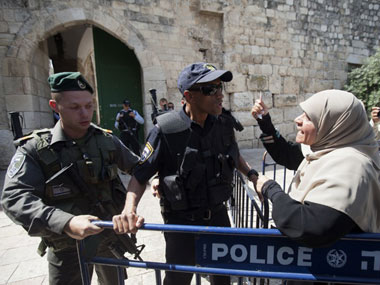When the leaders of Israel and Hamas in the same weekend offer each other long-term peace deals, you just know in your bones that we are passing through a potentially historic moment. Israeli Prime Minister Ehud Olmert said Sunday that Israel was prepared to leave much of the Occupied Territories, release many Palestinian prisoners, remove many roadblocks and checkpoints, and restore the delivery of withheld tax funds that belong to the Palestinians. Hamas leader, Khaled Meshaal, for his part said in Cairo a day earlier that the Palestinians expected to see serious progress towards a Palestinian state in all the territories occupied in 1967, or else a third intifada would break out. It would be easy for both sides to write off the offers that Olmert and Meshaal made as propaganda exercises. It would also be a great shame, because beneath their conditional and tentative public offers to live in peace are some crucial political realities that must be seized and built upon, before they evaporate: Israelis and Palestinians are nearing exhaustion in their existential battle for the land of Palestine-Israel, and both recognize that their prevailing military strategies will not achieve their long-term goals. They understand that the rest of the world is perfectly happy to watch them kill each other for years to come, so consequently they both seem prepared to explore means of achieving their basic national goals through peaceful negotiations. These men are not spelling out comprehensive, detailed peace plans. They demand of the other side much more than they are prepared to give. Neither will unilaterally offer the concessions demanded of them. Yet, we should recognize what they are doing this week: they are sending important signals of a conditional willingness to coexist, which they manifested in a more limited manner with their agreement to implement a cease-fire in Gaza last weekend. The Palestinians agreed to stop firing rockets into southern Israel, and Israel agreed to pull its troops out of Gaza and halt attacks against the Palestinians there. This is a significant opening that US President George W. Bush should pounce on when he visits the Middle East this week, so that the Palestinian-Israeli diplomatic flirting could be expanded into serious negotiations. This would unlock doors leading to calming or resolving other conflicts in the region, including Iraq, Lebanon, Syria and Iran. Bush and his Quartet partners should immediately call for an open-ended meeting with an Arab League delegation headed by several Arab heads of state to work on a single agenda item: reconciling the 2002 Arab Summit Peace Plan that offers Arab coexistence with Israel and a Palestinian state with Olmert’s and Meshaal’s offers and Bush’s vision of peace based on Israeli and Palestinian states living peacefully alongside each other. They should all come to the gathering on the basis of one inviolable principle: they will all stop their military activities and commit themselves to negotiations to achieve a mutually acceptable peace on the basis of United Nations resolutions and prevailing international law. Nothing else will be demanded or conceded other than this starting point for talks. This rare moment of Palestinians and Israelis hinting at their mutual right to live in peace and recognition coincides with Bush’s arrival in the Middle East at a decisive juncture in the region’s modern history. Political tensions and active wars plague half a dozen Arab countries, while the region suffers increased interference by non-Arab parties like Iran, the United States and the United Kingdom. Our region cannot afford to remain mired in worsening armed conflict, civil wars, and mindless self-destruction. It must instead move towards a more stable and satisfying future by rationally and systematically resolving the conflicts afflicting it. The Palestine-Israel conflict is at the center of the region’s continuing radicalization and militarization. Resolving it peacefully – which is possible – remains the single most useful contribution to lowering tensions throughout the entire area. The opening we have this week is fragile, but real. The players in the region and the principal actors abroad should not allow their cynicism, pride or narrow domestic political interests to overshadow their sense of responsibility or their basic decency and rationality at this crucial moment. If central characters such as Olmert and Meshaal are unilaterally making offers for peace and coexistence through temporary or open-ended truces, no matter how imprecise these offers are, the rest of us should jump on this new alignment of positions. It would be irresponsible folly to leave this for the US to handle on its own, given its proven track record as a partisan and unsuccessful mediator. If the Quartet with its “road map and the Arab League with its peace plan have any life left in them, this is their moment to work together quickly to push Israelis and Arabs toward a structured negotiation anchored in more explicit and mutual national rights for all concerned. Moments like this do not come along very often.
Rami G. Khouri writes a regular commentary for THE DAILY STAR.


